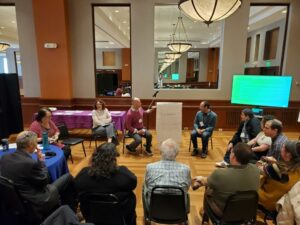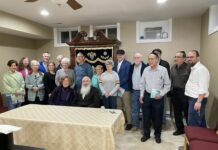Baltimore’s congregational schooling district is taking religious education to the next level.
Baltimore is one of five regions in the United States that will be participating in Project Bet-A, a collaboration with the Jewish Educational Project in New York that hopes to revitalize Hebrew schooling.

This two-year project was created in response to a massive decline in enrollment in congregational schools. According to a study conducted by Jewish Educational Project, congregational school enrollment decreased by 45% from 2006-2020, with over 550 schools closing permanently over that 14-year period. Conversely, enrollment in Jewish day schools increased by 43% over the same amount of time.
“In Baltimore, we’ve seen less of a decline in congregational school membership, but it’s still not the numbers it used to be,” said Julie Tonti, director of educator service at Jewish Educational Services and coordinator of Baltimore’s involvement in Project Bet-A.
“Because our mission is to support Jewish education in Baltimore, we thought this opportunity would benefit the community as a whole,” she added. “The idea is that we bring together the congregational schools to do really positive and impactful learning about what sparks Jewish joy and what sparks us and our community to thrive.”
Ten different congregational schools around the Baltimore area are participating in Project Bet-A. These include Baltimore Hebrew Congregation, Jewish Discovery Lab of Beth Am, Beth El Congregation’s Berman-Lipavsky Religious School and Chizuk Amuno’s Rosenbloom Religious School, among others.
Many leaders from these schools recently met for training, participating in the first of four educational modules that the project will provide for them over the next two years.
During this seven-hour training session, school leaders and synagogue representatives, including rabbis and office managers, learned about national trends in congregational school applications, did exercises focused on building group morale and discussed Jewish philosophical views on education as a field.
Project Bet-A’s ultimate goal is to provide congregational school teachers and leaders with the tools they need to create engaging, inclusive curricula and bring in more students and their families.
“I think that the idea is that we want to support everyone in the community, so everyone looking for a Jewish education can find something that speaks to and is meaningful to them,” Tonti explained. “There’s a huge diversity in needs, and we want to support our synagogues in really speaking to those families, children and students.”
While Project Bet-A will not provide congregational schools with a foolproof solution to declining enrollment numbers, it is meant to provide participating schools with a framework for operation that will help them thrive in the coming years. Integrating new methods of education and bringing people together to work collaboratively are paramount to the new methods Project Bet-A is experimenting with.
“It’s not an across-the-board answer for how to innovate. It lets each synagogue innovate on its own terms,” Tonti said.
The Jewish Educational Project accounts for the fact that every synagogue is different, and while making them operate uniformly is impossible, they can still provide help to congregational schools uncertain of their future, Tonti explained.
“We want to help kids find the beauty and the meaning in Jewish life,” she added.






